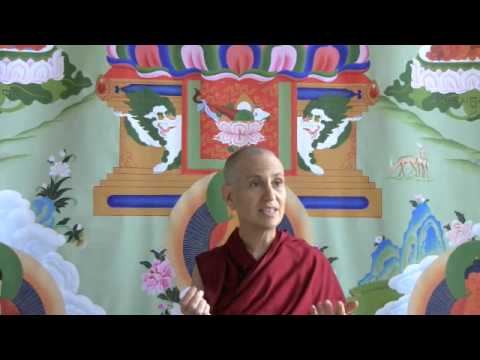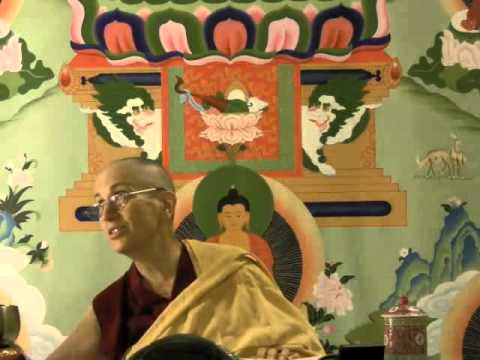Attachment to samadhi
Stages of the Path #94: The Four Noble Truths
Part of a series of Bodhisattva's Breakfast Corner talks on the Stages of the Path (or Lamrim) as described in the Guru Puja text by Panchen Lama I Lobsang Chokyi Gyaltsen.
- The importance of seeing all realms of cyclic existence as unsatisfactory
- The danger of attachment to deep states of concentration
- Remembering that we’re renouncing dukkha, not happiness
We’re on this verse here:
Violently tossed amidst waves of disturbing attitudes and karma;
Plagued by hordes of sea monsters, the three kinds of suffering;
We seek your inspiration to develop an intense longing
To be free from this monstrous ocean of boundless and vicious existence.
That is seeing primarily the first of the four noble truths—the truth of dukkha—that everything in cyclic existence is unsatisfactory.
One thing that’s important when we’re meditating about the truth of dukkha is to not only see our human realm as unsatisfactory, but to see the god realms also as unsatisfactory. At our level now we may think, “Well who in their right mind would want to be born in one of those god realms, because you just get entangled in all your attachment—if it’s a desire realm god. Or you’re blissed out in your samadhi, but what use it it, if you’re a form or formless realm god?” We may think, “Well why does somebody even want to be born there?” But little do we realize that there’s a lot of attachment to those states of being, and that attachment arises especially when we start developing deep concentration. There can be a tendency when serenity is attained—serenity is shamatha, or calm abiding—when that is attained, to really just crave that bliss of samadhi. And if we do that and stop there, and don’t have full revulsion for all of cyclic existence, then we’re not going to have the impetus to realize emptiness, and so we won’t attain full liberation. Instead the mind just gets like a moth to the light, gets so entangled with the bliss of samadhi, that we stay there, and then that creates what’s called the immutable (or unwavering) karma that creates the cause to be born in the corresponding level of the form or formless realm absorptions. And since one of the defilements is attachment for the upper realms—these levels of deep concentration—then that arises, and the mind stays in that kind of state, in that kind of rebirth, until that karma ends, and then kerplunk, down to the lower realms again. So it’s very important, in developing renunciation, to have renunciation for all of samsara.
It’s important, also, when we talk about renunciation, to realize that we’re not renouncing happiness. We’re renouncing dukkha. Many people get that messed up, and they think, “oh, Buddhism talks about renunciation, that means that I’ve just got to suffer. And through suffering I will attain enlightenment.” That is what brings these severe ascetic practices of self-torture, which is something that the Buddha really discouraged.
We have to remember that we are renouncing, or giving up, dukkha, the unsatisfactory experiences, and their causes, the six root afflictions, and all the other afflictions. The purpose we’re doing that is because we want real happiness. We’re not giving up real happiness, although we do want to go past the dukkha, or the unsatisfactoriness, of change, which is what we ordinary beings call pleasure. Remember that one? That one suffering has gone down, and the other one’s still small. That we do want to give up, because we see that it’s unsatisfactory. But that’s another form of dukkha. Real happiness is not something we want to give up.
Also, in practicing the path, it’s fine to have enjoyment, it’s fine to be happy. There’s nothing evil in it. What we want to be aware of is getting attached to that happiness, because the attachment is what gets us screwed up. Sometimes we can be just as attached to something when we don’t have it as when we do have it. We can look, when we’re craving some new object or craving a relationship or something, we can be very attached to it before we even have it. Having it isn’t the only way to be attached. And similarly, not having it isn’t the only way to be attached. So it’s fine to have happiness, but we just want to avoid getting stuck in it and being satisfied with ordinary pleasure that doesn’t cut it in terms of bringing lasting peace and happiness.
Venerable Thubten Chodron
Venerable Chodron emphasizes the practical application of Buddha’s teachings in our daily lives and is especially skilled at explaining them in ways easily understood and practiced by Westerners. She is well known for her warm, humorous, and lucid teachings. She was ordained as a Buddhist nun in 1977 by Kyabje Ling Rinpoche in Dharamsala, India, and in 1986 she received bhikshuni (full) ordination in Taiwan. Read her full bio.


